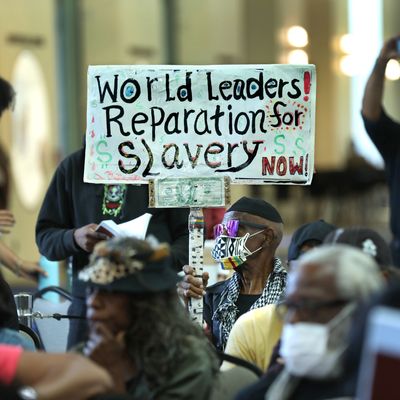
As Republicans have become mired in MAGA radicalism, it has become standard operating procedure for them to parry criticism of their extremist tendencies by pointing across the partisan barricades and shouting, “They’re worse!” This often involves scanning the landscape for any lefty idea or proposal that sounds scary and attributing it to the entire Democratic Party. And lo and behold, it turns out if you say Democrats want to “defund the police” often enough, people will begin to believe it, even though (1) Democratic elected officials from Joe Biden down to the local dogcatcher have vociferously denied it and (2) the criminal-justice reformers who actually have talked about “defunding the police” were mostly proposing that functions remote from proper policing be shifted (along with the funding to pay for them) from police departments to social-services agencies.
Inspired by the effectiveness of such tactics, conservatives are always on the hunt for some phantom menace they can attribute to Democrats or (more vaguely) “the left.” They may hit the jackpot this weekend, as a state-appointed task force in California considers legislative recommendations for slavery reparations (which won’t be finalized until July 1).
The task-force report, spurred by the racial justice protests of 2020 and the product of several years of research, will be wide-ranging, documenting many decades of discrimination against descendants of slavery in California in areas ranging from housing, overincarceration, and denial of health benefits. Its recommendations will be for policy changes to prevent future discrimination, not simply reparations for individuals. The task force, moreover, is only calling for “down payments” on justified reparations, and it’s clear the legislature may reject cash awards altogether. But conservative media is already leaping to report scary-sounding figures based on estimates of actual economic damages to Black people, as in this Fox News piece:
Economists advising California’s task force for reparations have estimated that it will cost $1.2 million per Black resident, paid over a lifetime.
California is one of multiple states debating the feasibility of economic reparations for Black Americans whose ancestors were victimized by the Atlantic slave trade and its legacy, despite the fact California was designated as a free state when it joined the Union. The push for reparations gained major momentum in 2020 after the death of George Floyd at the hands of police, but it remains an economically and culturally controversial topic.
California, which frequently makes national headlines for experimental progressive policies, has recently reached an economic estimate.
The Hill adds this tidbit to its report on the estimated damages:
Questions of whether the state even has the finances for the payouts has been brought into question. California has an annual budget of around $237 billion, but economists on the panel said reparations could cost the state more than $800 billion.
And the panel added that the list of suggested sums is not exhaustive — these numbers lean on the conservative side and at best are a “very cautious initial assessment for what cost, at a minimum, the State of California is responsible.”
As those eager to focus on those alarming numbers know, slavery reparations (not the general concept, but the idea of individual cash payments to whole classes of people) is a highly controversial and even divisive topic. A Pew survey last November made that very clear:
Views of reparations for slavery vary widely by race and ethnicity, especially between Black and White Americans. Around three-quarters of Black adults (77%) say the descendants of people enslaved in the U.S. should be repaid in some way, while 18% of White Americans say the same.
Add in partisanship, and you have a real divide:
[O]nly 8% of Republicans and GOP leaners say these descendants should be repaid in some way, and 91% say they should not.
But the issue divides Democrats, which makes it an ideal Republican wedge issue:
Among Democrats and Democratic-leaning independents, views are split: 48% say descendants of enslaved people should be repaid in some way, while 49% say they shouldn’t be repaid.
Governor Gavin Newsom and Democratic legislative leaders called for and appointed members to the reparations task force, so they will by no means ignore its recommendations. But you can assume any legislative action will be cautious and measured. The task force itself has already voted to limit potential reparations to Black citizens who can show they are “descendants of free and enslaved Black people who were in the U.S. in the 19th century,” instead of making all Black Californians (still only 6.5 percent of the state’s population) eligible. But with the 2024 elections looming, we probably won’t hear much nuance from those crying havoc at the very idea of reparations, even in this one state.
More on politics
- NYPD Arrests Pro-Palestinian Protesters at Columbia University: How It Happened
- What Happened in the Trump Trial Today: ‘We Have Our Jury’
- Biden’s Uncle (Probably) Wasn’t Eaten by Cannibals






























